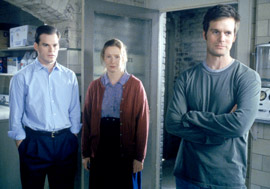 One of my favorite shows of all time was Six Feet Under. What made the show so great was that, even though every once in a while something extraordinary happened, most of the drama came from every day life decisions: where to go to school, whether to stay in a relationship, or when to change careers. The show was compelling because the narrative of every day lives doesn’t lack for drama. We all make decisions that might not matter to the rest of the world, but matter a lot to us.
One of my favorite shows of all time was Six Feet Under. What made the show so great was that, even though every once in a while something extraordinary happened, most of the drama came from every day life decisions: where to go to school, whether to stay in a relationship, or when to change careers. The show was compelling because the narrative of every day lives doesn’t lack for drama. We all make decisions that might not matter to the rest of the world, but matter a lot to us.
The more I read, study, and think about narrative, the less is seems to do with writing. Narrative is about storytelling, and storytellers are everywhere: sports announcers, radio talk show hosts, car salesmen, speed daters. Everyone spins a story – yours or theirs – and creates a narrative about what happened or what will happen. The Bears lost because they got sloppy. Obama won because he gave people hope. The new iMac will make your life easier.
And when we tell stories about ourselves, we reveal our character: who we are or how we’ve changed. People tell these stories all the time, consciously or not, to define themselves to others.
When I was still single, I would often tell my “worst date” story to women I was out with for the first time. The “worst date story” recounted a nightmarish date I had just one summer when I was still in college: I was invited to a woman’s home for dinner and I proceeded to accidentally drop and shatter her blender, destroy her telephone, and spill food all over her dining room floor. Afterward, I tried to make up for my clumsiness by taking her out for dessert. On the way, I stopped for gas. After filling up the tank, I left the nozzle in the tank of my car and drove off, breaking the nozzle. The cashier ran after me, screaming and flailing his arms like he was on fire. I didn’t have enough money to pay for the damage and didn’t have a credit card. This was before the debit card era, so the three of us – me and my date in the front, the Iranian gas station attendant in the backseat – drove a few miles down Wilshire Boulevard to my bank, where I took out $100 to pay for the broken nozzle. We returned to the gas station to drop off the cashier and get a receipt and sign a few papers. And then we got ice cream.
I loved to tell this story on first dates for three reasons: first, it made my dates laugh; second, it showed them I didn’t take myself too seriously and could laugh at myself; and third, our date was bound to be much better in contrast.
Often, people share one major, defining narrative, a story that they feel defines their lives. As John Barth wrote, “Everyone is necessarily the hero of his own life story.”
The American defining narrative is simple: we were a bunch of scattered colonists living under British rule, but we came together and demanded freedom and independence. Our unity helped us not only to beat the British, but to grow into a large, prosperous nation. That founding narrative, boiled down to five words – we fought to be free – provides the backbone for much of American politics. Land of the free. Home of the brave. It defines what we think we are supposed to be.
My brother’s defining narrative – I’ve heard it many times over the years – goes something like this: when he and his wife got engaged, they decided to quit their jobs, move to San Francisco, and start a new life there. Their parents were shocked and told them it was reckless. They went anyway. No jobs. No place to live. No savings. Rising debt. But they believed in themselves. And soon, my brother found a great job and his wife opened a photography studio in their loft apartment. They were happy. Stressed, but happy. The job my brother found established his reputation as a dynamic, smart professional and helped him later become one of the youngest Senior Vice Presidents in the history of Disney. They moved back to Los Angeles, built a home and a family, richer from the risks they took.
Their story says the following: they weren’t afraid of risk and change, and in turn, they succeeded. It is a narrative that defines not only their relationship, but how they look at life. For them, as my sister-in-law likes to say, “change is good.” Risk is good. Believing in themselves brings success. It’s not just a story, it’s an outlook on life.
All of these examples remind me that the storytelling process is natural and intuitive. We tell stories every day, and our stories have underlying themes and meaning. But writers often go out of our way to make the process difficult and complicated. We tend to overthink things and try to invent new ways to do something that we already do all the time. We try a little too hard to construct “gotcha” ledes and memorable closing lines, rather than focusing more on the story that flows in between.